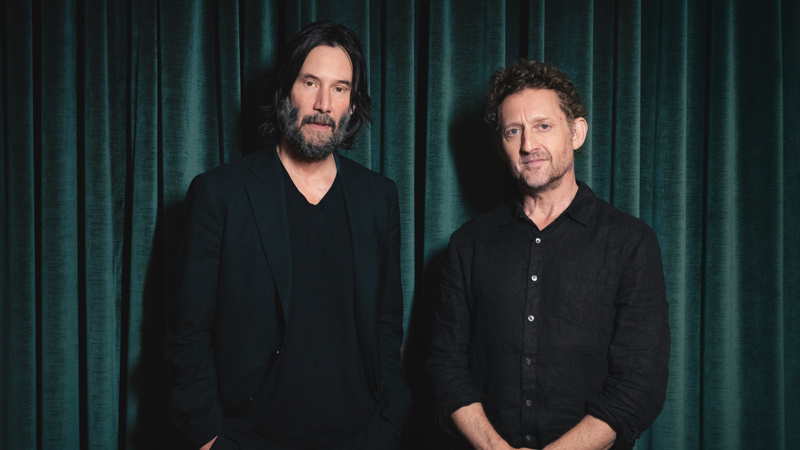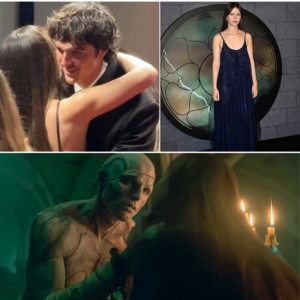
In the dim, echoing halls of Broadway’s Hudson Theatre, where the ghosts of past triumphs linger like unspoken regrets, a new era of existential absurdity is about to unfold. Samuel Beckett’s Waiting for Godot, the towering tragicomedy that has puzzled, provoked, and profoundly moved audiences since its 1953 premiere, returns to the Great White Way in a revival that promises to be as audacious as it is intimate. At its heart are two unlikely yet perfectly matched tramps: Keanu Reeves as the hapless Estragon and Alex Winter as the philosophizing Vladimir. The duo, forever bonded as Ted “Theodore” Logan and Bill S. Preston, Esq. in the cult-classic Bill & Ted’s Excellent Adventure franchise, are reuniting not for time-traveling hijinks but for a meditation on futility, friendship, and the human condition. Previews kicked off on September 13, with opening night set for September 28, and producers have just unveiled the first-look photos – stark, shadowy images that capture the play’s barren essence while hinting at the electric chemistry between its stars. In an exclusive glimpse shared with Theater Spotlight, these images reveal Reeves and Winter not as action heroes or slacker icons, but as two souls adrift in Beckett’s void, their faces etched with weariness and wry humor. It’s a debut that feels like destiny: Reeves’ first foray onto Broadway’s boards, Winter’s return after decades away, and a production directed by the visionary Jamie Lloyd that strips the classic to its raw, radio-play bones.
The announcement of this revival back in August 2024 sent shockwaves through the theater world, blending Hollywood star power with highbrow literary heft in a way that’s rare for Broadway’s fall season. Waiting for Godot, often hailed as the most significant English-language play of the 20th century, has long been a rite of passage for actors seeking to prove their dramatic chops. From Bert Lahr and E.G. Marshall in the 1956 Broadway premiere to the iconic 2013-14 pairing of Patrick Stewart and Ian McKellen, the play’s central duo of Vladimir (Didi) and Estragon (Gogo) has attracted a pantheon of talent: Robin Williams and Steve Martin in 1988, Nathan Lane and Bill Irwin in 2009, even Michael Shannon and Paul Sparks in a 2017 off-Broadway run. But none quite like Reeves and Winter – real-life friends of nearly four decades, whose on-screen camaraderie was forged in the neon glow of ’80s teen comedy. “We’ve known each other a very long time,” Winter said during a Tony Awards red-carpet chat in June 2025. “It’s a play about two people who have known each other a very long time, which actually matters, I think, to the play.” Their history isn’t just nostalgia fodder; it’s the secret sauce that could infuse Beckett’s bleak landscape with unexpected warmth.

For the uninitiated – though who hasn’t brushed against Godot‘s shadow? – the play unfolds on a desolate country road, where Vladimir and Estragon pass endless time awaiting the mysterious Godot, who never arrives. Their banter veers from vaudeville slapstick to profound despair, punctuated by the arrival of the tyrannical Pozzo (Brandon J. Dirden) and his burdened servant Lucky (Michael Patrick Thornton), and fleeting visits from a boy (alternating between Zaynn Arora and Eric Williams). Premiering in French as En attendant Godot in Paris before its English-language debut in London in 1955, the work baffled early audiences – one infamous review called it “a pseudo-intellectual farce” – but quickly became a cultural juggernaut. Translated into dozens of languages, it has inspired operas, dances, films, and even video games, its themes of existential waiting resonating in a post-war world grappling with absurdity. On Broadway, revivals have been sporadic but seismic: the 1957 all-Black cast production at the Ethel Barrymore Theatre ran just six performances but explored Africana absurdism; the 1988 Lincoln Center version with Williams and Martin drew crowds but mixed reviews; and the 2013 McKellen-Stewart tour de force sold out for months, proving Godot‘s timeless pull. Now, in 2025, with global anxieties at a fever pitch – pandemics, wars, and an AI-driven future that feels like Godot’s eternal tease – Lloyd’s take arrives like a much-needed mirror.
Jamie Lloyd, the Tony- and Olivier Award-winning wunderkind behind Broadway smashes like Sunset Boulevard (2024) and A Doll’s House (2023), is no stranger to reimagining classics with minimalist ferocity. His Godot – produced by The Jamie Lloyd Company, ATG Productions, Bad Robot Live, and Gavin Kalin Productions – evokes a “radio play” aesthetic, thrusting the audience’s imagination into overdrive. Soutra Gilmour’s set and costumes are sparse: a void of black, lit by Jon Clark’s stark beams, with Ben and Max Ringham’s sound design amplifying every rustle and sigh. Hair and makeup by Cheryl Thomas keep the actors’ faces exposed, vulnerable. “What does a radio play do? It makes the play alive in terms of the imagination of the listener,” Reeves explained during a recent press day at Zero Bond, flanked by Winter and Lloyd. “And the performer,” Winter chimed in. “If it’s you and I engaged with Pozzo and Lucky, suddenly our imagination is on fire.” Casting director Jim Carnahan paired the leads with Dirden (a Tony nominee for All the Way) as the bombastic Pozzo and Thornton (from Lloyd’s A Doll’s House) as the silent, explosive Lucky – a ensemble that balances star wattage with stage gravitas.
The first-look photos, captured by lensman Andy Henderson and released on September 13 ahead of previews, are a masterclass in visual poetry. In one arresting image, Reeves – clad in ragged layers that evoke his John Wick resilience stripped bare – hunches against an invisible barrier, his trademark intensity furrowed into Estragon’s bewildered pout. His eyes, those soulful pools that have conveyed Neo’s doubt and John’s rage, now brim with a childlike frustration, one hand clutching at Winter’s sleeve as if anchoring himself to reality. Winter, lean and watchful, towers slightly as Vladimir, his expression a cocktail of wry amusement and quiet desperation – a far cry from Bill’s air-guitar exuberance, yet echoing its loyal goofiness. Another shot freezes them mid-banter: mouths agape in laughter that teeters on tears, bodies leaning into each other like weary trees in a storm. The third captures the full quartet – Dirden looming imperiously as Pozzo, Thornton bowed under Lucky’s burdens – against a pitch-black backdrop, spotlights carving harsh shadows that swallow the edges. These aren’t glossy promo glossies; they’re invitations to the void, hinting at a production where silence speaks louder than soliloquies.
Reeves, 61, has long been theater’s prodigal son. His stage roots trace to Toronto’s Royal Conservatory, where he honed Shakespeare and Chekhov, and early off-Broadway stints like Romeo and Juliet in 1991. But Hollywood’s siren call – Speed, The Matrix, John Wick – kept him from Broadway until now. “When I read the play in my late teens, it just stayed with me,” he said during rehearsals. “Let’s go. We can’t. Why not? We’re waiting for Godot.” Those lines, he says, have “rattled around” his head for decades, a mantra for life’s pauses. Preparing for Estragon – the more physical, memory-lapsed half of the duo – Reeves dove deep: clowning workshops, Butoh dance (that Japanese avant-garde form of stark, anguished movement), and Beckett pilgrimages. He and Winter jetted to the University of Reading’s archives in April 2025, poring over manuscripts amid Ph.D. theses. There, wedged in stacks, Reeves spontaneously declaimed Estragon’s plea – “Do you see me?” – hand outstretched, Winter finishing the echo. It was a moment of pure synchronicity, the kind that Bill & Ted fans adore.
Winter, 60, brings Broadway blood to the boards. A child actor, he debuted at age 10 in The King & I opposite Yul Brynner (1977-78) and followed with John Darling in Sandy Duncan’s Peter Pan (1979), plus the American premiere of Simon Gray’s Close of Play at Manhattan Theatre Club. Post-Bill & Ted, he veered into directing (Showbiz Kids, The YouTube Effect) and activism, but theater’s pull endured. As Vladimir, the hat-wearing intellectual, Winter channels his wry edge – think Bill’s stoner wisdom, tempered by life’s absurdities. “Keanu and I love working together and have a kind of shorthand as friends,” he shared. During auditions, they even toyed with switching roles nightly – a daredevil idea nixed by Winter’s veteran savvy and the eight-shows-a-week grind.
Their friendship, the production’s secret weapon, infuses rehearsals with levity. “It’s very, very personal,” Winter teased at the Tonys. From Excellent Adventure (1989) to Bogus Journey (1991) and Face the Music (2020), they’ve navigated Hollywood’s highs and lows – Reeves’ tragedies, Winter’s pivot to docs – emerging unbreakable. “Bill and Ted are about saving the world through friendship,” Reeves mused. “Didi and Gogo? They’re saving each other in a world that doesn’t care.” That kinship shines in the photos: a tactile bond, hands on shoulders, eyes locked in shared bewilderment.
Lloyd’s vision amplifies this humanity. Fresh off Sunset Boulevard‘s triumph, he treats Godot as a “sublime masterpiece.” No props, no tree – just actors in the dark, voices conjuring the barren road. “You’re seeing a Waiting for Godot unlike any other specifically because these actors are bringing themselves to the play,” Lloyd said. Dirden’s Pozzo, a Tony-caliber force from Thoughts of a Colored Man, brings tyrannical bluster; Thornton’s Lucky, poignant in silence, erupts in the play’s infamous monologue. The Boy alternates add innocence’s sting.
Anticipation buzzes like a sold-out house. Tickets, from $49 via digital lottery and rush, fly fast – the limited run ends January 4, 2026. Early buzz from previews? Electric. “It’s ridiculous! Life, and this play,” the website quips. Fans flood social media with #GodotWithKeanuAndAlex, memeing Ted waiting for Rufus as Gogo for Godot. Critics ponder: Will it transcend? One outlet predicts “a gut-punch of authenticity.”
In these first-look images, we glimpse not just a revival, but a revelation. Reeves and Winter, icons of joy and grief, embody Beckett’s tramps: waiting, wondering, wholly human. As previews hum and opening nears, one line lingers – “We’re waiting for Godot.” In this Godot, perhaps the wait was worth it. After all, in absurdity’s embrace, friendship endures.





